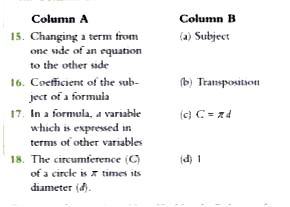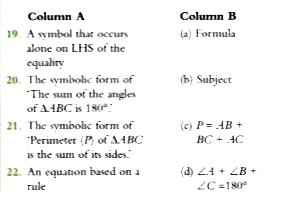Complete Solutions to CONCEPT APPLICATION (Level 1) of chapter FORMULAS of Class 7 book with complete answers and questions
| Class 7 | MATHS |
| Chapter | FORMULAS |
| PEARSON IIT JEE FOUNDATION | CONCEPT APPLICATION (Level 1) |
| Number Of Questions | 16 |
| Academic Year | 2023-24 |
The symbolic form of "the sum of four angles in a quadrilateral PQRS is `360^(@'')` is___
View SolutionThe symbolic form of "time taken (0 for a journey is the quotient of distance covered (d) and average spped (s)" is____
View SolutionThe symbolic form of "area of a sector (A) is half of the product length of the are (l) and radius (r)" is _______
View SolutionThe symbolic form of volume (v) of a cube is cube of its length (s)" is______
View SolutionThe symbolic form of "area (A) of a trapezium is half of the product of distance between the paralel side (h) and sum of the lengths of parallel sides (a,b)" is____.
View SolutionThe number of auxiliary formulae that can be derived from `P=(x)/(360^(@))(2pir)` _______
View SolutionIf `A=(S)/(N)`, then N=________
View SolutionThe symbolic form of "6 less than twice p is equal to 3 more than q" is_______
View SolutionThe subject of the folulae, `s=ut+(ut^(2))/(2)` is____
View Solutionthe formulae obtained by transforming the subject in the given formula are called_____
View SolutionThe cost price C is given by the formula C=`(100s)/(100+g)`, where S=selling price and g=gain in %. Make S the subject of the formula . Find S, if `C=rs800` and g=20. The following steps are involved in solving the above problem. Arrange them in sequential order.
(A) `rArr100S=C(100+g)`
(B) `S=((100+g)C)/(100)`
(C) Given `C=(100S)/(100+g)`
(D) `therefore S=((100+20)xx800)/(100)=rs960`
View SolutionIn the formulae `S_(n)=(n)/(2){2a+(n-1)d}` make d as the subject
The following steps are involved in solving the above problem. Arrange them in sequential order.
(A) `(n-1)d=(2S_(n))/(n)-2a`
(B) Given, `S_(n)=(n)/(2)[2a+(n-1)d]rArrn[2a+(n-1)d]`
=`2S_(n)`
(C) `rArr d=(2)/(n-1)[(S_(n))/(n)-a]`
(D) `2a+(n-1)d=(2S_(n))/(n)`
View SolutionThe compound interest on a certain sum is given by `C.I.=P(1+(R)/(100))^(n)-P`. Find C.I. when `P=rs1000,R=10%` P.a., and n=2.
The following steps are involved in solving the above problem. Arrange them in sequential order.
(A) `therefore C.I.=rs210`
(B) `1000((11)/(10))((11)/(10))-1000=1210-100`
(C) Given `Cl=P(1+(R)/(100))^(n)-P,P=rs1000`,
R=10% p.a., and n=2
(D) C.I. =`1000+(1+(10)/(100))^(2)-1000`
View SolutionThe focal length of a less is given by the formula `(1)/(f)=(1)/(u)+(1)/(v)`. Make f as the subject of the formula.
if `u=20cm` and v=30, then find f.
The following steps are involved in solving the above problem. Arrange them in sequential order.
(A) Given `(1)/(f)=(1)/(u)+(1)/(v)`
(B) `rArr f=(uv)/(u+v)`
(C) `f=(20xx30)/(20+30)=(600)/(50)=12`cm.
(D) `rArr (1)/(f)=(v+u)/(uv)`
View SolutionDirections for questions : Match Column A with Column B.

View SolutionDirections for questions : Match Column A with Column B.

View Solution
CONCEPT APPLICATION (Level 1) questions and complete solutions for chapter FORMULAS of PEARSON IIT JEE FOUNDATION of Class 7